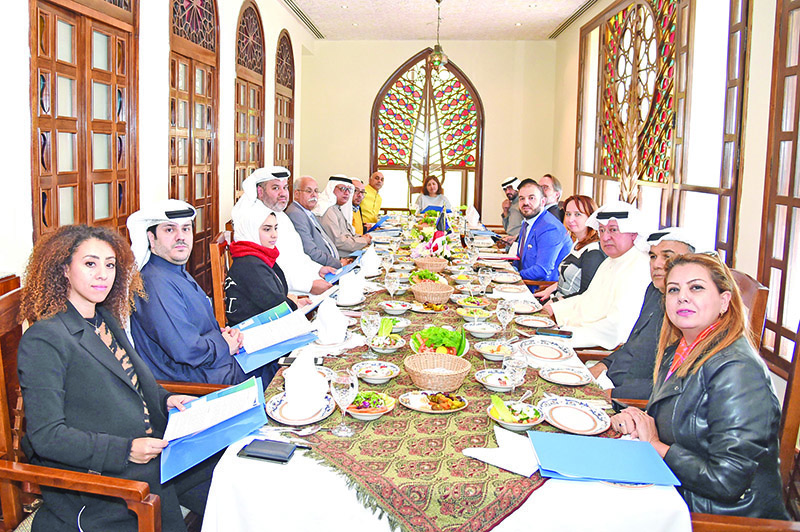
KUWAIT: The European Union considers the State of Kuwait as an increasingly important partner and aspires to have a comprehensive and multi-dimensional cooperation with the Gulf state covering political dialogue, economy and trade, in addition to sectorial and regional cooperation. This statement was made by Ambassador Cristian Tudor, Head of the Delegation of the European Union to Kuwait, during a lunch with media representatives yesterday.
"The relations between the EU and Kuwait have been historically strong," Ambassador Tudor said. "Kuwait has played a key role in promoting region-to-region engagement between the EU and the Gulf Cooperation Council (GCC) under the framework of the 1988 EU-GCC Cooperation Agreement. More recently, our bilateral relations have experienced a major impetus. Kuwait was the first country in the Gulf to sign a Co-operation Arrangement with the European External Action Service (EEAS) in July 2016, that provides a platform for regular political consultations covering common regional challenges in the Middle East and beyond. It also provides for sectorial consultations in the fields of energy including clean and renewable energy, security and counter-terrorism, development cooperation and other areas of mutual interest."
Ambassador Tudor also touched on the economic ties between the EU and Kuwait, which he descried as an "important focus of the bilateral relationship as the EU is the third trade partner for Kuwait" according to 2018 statistics. "The two sides are engaged in regular dialogue on trade and investment and macroeconomic issues under the GCC framework," he said. "The EU is keen to enhance this dialogue in support of Kuwait's 'Vision 2035' to diversify its economy, building up on the long-established ties that EU member states enjoy with Kuwait."
"EU's cooperation with Kuwait remains anchored around the GCC with a close partnership especially on the economic agenda and how we can mutually address our employment, trade and fiscal challenges," he further noted. "Kuwait's role last year as GCC Presidency and the efforts of His Highness the Amir Sheikh Sabah Al-Ahmad Al-Jaber Al-Sabah to try to resolve the Gulf rift were strongly supported by the EU. This year, Kuwait and the EU co-chaired the 3rd EU-GCC Business Forum with the strong support of KDIPA, the Kuwait Chamber of Commerce and the Supreme Council for Planning and Development."
EU and the Arab World
Meanwhile, Ambassador Tudor highlighted efforts taken this year to enhance cooperation between the EU and Arab states, which were crowned by hosting a joint summit in Egypt. "This year, an important milestone was reached in cooperation between the European Union and our Arab neighbors, with the first-ever EU-Arab League Summit in Sharm El Sheikh, held in 24-25 February, in which HH the Amir of Kuwait played a key role," he said. "Consensus was reached on important regional issues such as the Middle-East Peace Process but also on building further linkages between our peoples."
"'In a moment of regional and global tensions, Kuwait is a voice of wisdom and a force for peace. And this is what has made us natural partners in these difficult times.' Those were the words of High Representative/Vice-President, Federica Mogherini at the opening of the Delegation of the EU to the State of Kuwait on July 14, 2019," he stated.
"Among the top Arab donors, Kuwait is also an important ally of the EU in the humanitarian field," he further noted. "The EU and Kuwait have demonstrated their readiness to cooperate on jointly tackling international challenges by co-chairing several important international events, such as the Brussels Conference on supporting the future of Syria and the region, the Kuwait International Conference on the reconstruction of Iraq or the International Conference on the Plight of the Rohingya."
People-to-people relations
The strong relationship between EU and Kuwait goes beyond the political and economic arenas, and expands to include the social field as well. "It is not exclusively government to government engagement - this is matched by people to people exchanges - business to business dialogue, education and parliamentary exchanges as well as cultural diplomacy," he said. "The visit of a delegation from the European Parliament last December that was hosted by the National Assembly should be followed by a return visit to Brussels by Kuwaiti parliamentarians."
"Also in December last year, the EU awarded the EU-GCC Human rights Chaillot Prize to LOYAC, the Kuwaiti non-profit organization working on professional development and personal growth of young people, in recognition of its work in empowering youth and in enriching civic and cultural life in Kuwait," he declared. "The EU also regularly supports cultural and educational activities in Kuwait, in partnership with local civil society organizations. In terms of cultural diplomacy and people-to-people relations, the EU sponsorship of the 2nd and 3rd annual LAPA Festivals of Art and Dance is notable. A total of five workshops and seminars that the EU co-organized during the past year with the Kuwait Society for Human Rights, LOYAC and the Kuwait Women's Cultural and Social Society are proof positive of the strength of these relations."
"The Kuwaiti people and civil society in Kuwait are thus an integral part of the relations between the EU and Kuwait," he mentioned. "On a people-to-people level, the EU offers the opportunity to students, researchers and higher education and research institutions from Kuwait to participate in Erasmus+ and the Marie Sklodowska-Curie Actions, with special funding allocated to support candidates from the Gulf region." The ambassador concluded by hoping that 2020 will be remembered as "the best year yet in EU-Kuwait relations."










